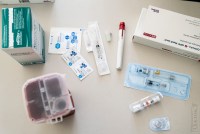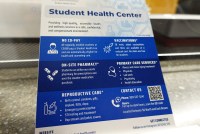Latest KFF Health News Stories
Feds Join Ranks of Employers with Generous Fertility Benefits
Starting this year, federal employees can choose plans that cover a broad menu of fertility services, including up to $25,000 annually for in vitro fertilization procedures. At the same time, politics around IVF and reproductive health have become a central issue in the current election-year debate.
End of Internet Subsidies for Low-Income Households Threatens Telehealth Access
A federal program that helped pay for more than 23 million low-income households’ internet access runs out of money soon. The end of the subsidy launched earlier in the pandemic could have profound impacts on health care access.
The GOP Keeps Pushing Medicaid Work Requirements, Despite Setbacks
Work requirements in Medicaid expansion programs are back on the agenda in many statehouses — despite their lackluster track record. In Mississippi, the idea has momentum from GOP lawmakers advancing legislation to expand Medicaid. In Kansas, the Democratic governor proposed work requirements to try to soften Republican opposition to expansion. (She’s had little luck, so […]
Heat Protections for California Workers Are in Limbo After Newsom Abandons Rules
Proposed rules to protect millions of workers from potentially dangerous heat inside workplaces are dead after Gov. Gavin Newsom’s administration refused to sign off. Labor advocates and state regulators are calling for emergency regulations before temperatures soar this summer.
La deuda médica afecta a gran parte de EE.UU., pero en especial a inmigrantes en Colorado
Las luchas del área reflejan una paradoja sobre Colorado. En general, la carga de deuda médica del estado es más baja que la de la mayoría. Pero las disparidades raciales y étnicas son más amplias.
Medical Debt Affects Much of America, but Colorado Immigrants Are Hit Especially Hard
Colorado is ahead of the curve on policies to prevent medical debt, but the gap between the debt load in places inhabited primarily by people of color versus non-Hispanic white residents is greater than the national average.
Attacks on Emergency Room Workers Prompt Debate Over Tougher Penalties
In California, assaulting paramedics or other emergency medical workers in the field carries stiffer fines and jail time than assaulting emergency room staffers. State lawmakers are considering a measure that would standardize the penalties.
ACA Plans Are Being Switched Without Enrollees’ OK
Insurance agents say it’s too easy to access consumer information on the Affordable Care Act federal marketplace. Policyholders can lose their doctors and access to prescriptions. Some end up owing back taxes.
Track Opioid Settlement Payouts — To the Cent — In Your Community
Want to know how much opioid settlement money your city, county, or state has received so far? Or how much it’s expecting in the future? Use our new searchable database to find out.
California Universities Are Required to Offer Abortion Pills. Many Just Don’t Mention It.
One year after California became the first state to require public universities to provide abortion pills to students, LAist found that basic information for students to obtain the medication is often nonexistent.
More Patients Are Losing Their Doctors — And Trust in the Primary Care System
A shortage of primary care providers is driving more people to seek routine care in emergency settings. In Rhode Island, safety-net clinics are under pressure as clinicians retire or burn out, and patients say it’s harder to find care as they lose connections to familiar doctors.
How Primary Care Is Being Disrupted: A Video Primer
Under pressure from increased demand, consolidation, and changing patient expectations, the model of care no longer means visiting the same doctor for decades.
For-Profit Companies Open Psychiatric Hospitals in Areas Clamoring for Care
State institutions and community hospitals have closed inpatient mental health units, often citing staffing and financial challenges. Now, for-profit companies are opening psychiatric hospitals to fill the void.
Four Years After Shelter-in-Place, Covid-19 Misinformation Persists
False claims that covid vaccines cause deaths and other diseases are still prevalent despite multiple studies showing the vaccines are safe and saved lives.
Hospitals Cash In on a Private Equity-Backed Trend: Concierge Physician Care
Hospitals are increasingly stretching a velvet rope, offering “concierge service” to an affluent clientele. Critics say the practice exacerbates primary care shortages.
Journalists Dig Into Measles, Abortion Access, and Medicaid Expansion
KFF Health News and California Healthline staff made the rounds on national and local media in recent weeks to discuss their stories. Here’s a collection of their appearances.
Your Doctor or Your Insurer? Little-Known Rules May Ease the Choice in Medicare Advantage
Disputes between hospitals and Medicare Advantage plans are leading to entire hospital systems suddenly leaving insurance networks. Patients are left stuck in the middle, choosing between their doctors and their insurance plan. There’s a way out.
A Physician Travels to South Asia Seeking Enduring Lessons From the Eradication of Smallpox
Physician and podcast host Céline Gounder traveled to India and Bangladesh and brought back never-before-heard stories, many from public health workers whose voices have been missing from the record documenting the eradication of smallpox.
A State-Sanctioned Hospital Monopoly Raises Concerns
The Federal Trade Commission has long argued that competition makes the economy better. But some states have stopped the agency from blocking hospital mergers that create local or regional monopolies, and the results have been messy. Two dozen states have at some point passed controversial legislation waiving anti-monopoly laws, allowing rival hospitals to merge and replacing competition […]
Históricamente, las enfermedades vinculadas al abuso del alcohol han afectado más a los hombres. Pero datos actuales de los Centros para el Control y Prevención de Enfermedades (CDC) muestran que las tasas de muerte por esta causa están aumentando más rápido entre las mujeres que entre los hombres.
























